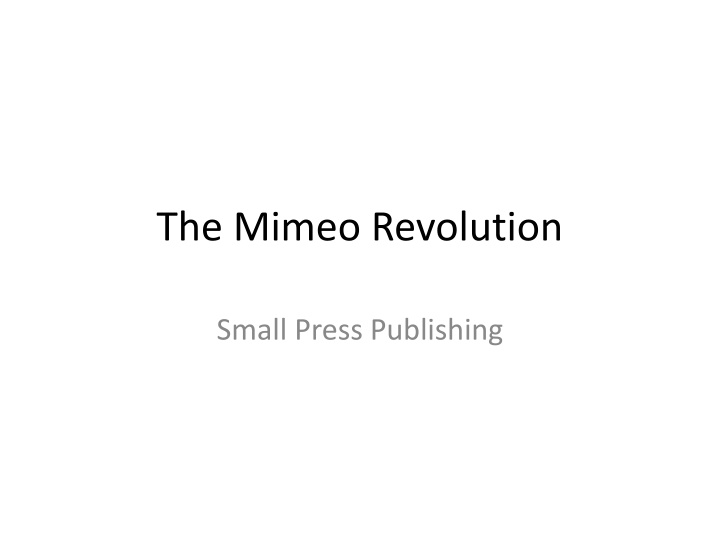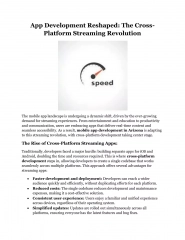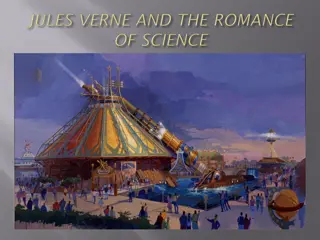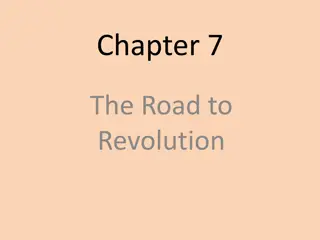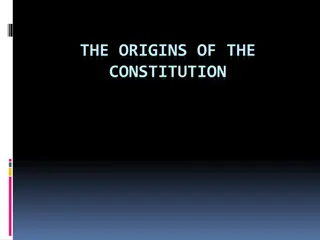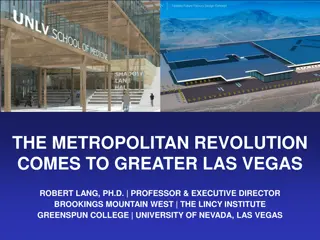The Mimeo Revolution
Dive into the Mimeo Revolution with this exploration of small press publishing, a movement that changed the literary landscape by democratizing the dissemination of literature. Discover the history, impact, and significance of mimeograph printing in fostering independent voices and challenging the traditional publishing industry. Uncover how this grassroots approach paved the way for marginalized writers to share their stories and revolutionized the distribution of literary works.
Download Presentation

Please find below an Image/Link to download the presentation.
The content on the website is provided AS IS for your information and personal use only. It may not be sold, licensed, or shared on other websites without obtaining consent from the author.If you encounter any issues during the download, it is possible that the publisher has removed the file from their server.
You are allowed to download the files provided on this website for personal or commercial use, subject to the condition that they are used lawfully. All files are the property of their respective owners.
The content on the website is provided AS IS for your information and personal use only. It may not be sold, licensed, or shared on other websites without obtaining consent from the author.
E N D
Presentation Transcript
The Mimeo Revolution Small Press Publishing
Mimeograph Machine Gestetner Duplicator Stock Footage
Groupings: Black Mountain San Francisco Renaissance Beat Generation New York Poets
Robert Creeley and Dan Rice at Black Mountain College, 1955. Photograph by Jonathan Williams
Origin (1951-1984) Cid Corman
The Jargon Society (1951) Jonathan Williams
Divers Press (1953-1955) Robert Creeley
Often I Am Permitted to Return to a Meadow as if it were a scene made-up by the mind, that is not mine, but is a made place, that is mine, it is so near to the heart, an eternal pasture folded in all thought so that there is a hall therein that is a made place, created by light wherefrom the shadows that are forms fall. Wherefrom fall all architectures I am I say are likenesses of the First Beloved whose flowers are flames lit to the Lady. She it is Queen Under The Hill whose hosts are a disturbance of words within words that is a field folded. It is only a dream of the grass blowing east against the source of the sun in an hour before the sun s going down whose secret we see in a children s game of ring a round of roses told. Often I am permitted to return to a meadow as if it were a given property of the mind that certain bounds hold against chaos, that is a place of first permission, everlasting omen of what is.
The Beats City Lights Books (1953)
The New York School Tibor de Nagy Frank O Hara, Oranges (1953)
Language writing Bernadette Mayer, Midwinter Day [1978], Turtle Island Foundation, 1982 Clark Coolidge, Polaroid, Big Sky Books, 1975
The Floating Bear, LeRoi Jones, Diane DiPrima (1961-1971)
William Everson working the press in Waldport
San Francisco Renaissance (1943) William Everson Robert Duncan Jack Spicer Stan Persky Donald Allen White Rabbit Press Auerhahn Press Four Seasons Foundation
Jack Spicer, second from left, with members of the staff of the Poetry Center at San Francisco State College in 1957: Ida Hodes, Ruth Witt-Diamant and Robert Duncan
Berkeley Renaissance Jack Spicer, J (1959) Stan Persky, Open Space (1964)
Yugen LeRoi Jones, Hettie Cohen (1958-1962)
Gary Snyder, Four Changes (1969) & ecological activism
Ethnopoetics/ Deep Image Alcheringa (1970-1980) Jerome Rothenberg, Dennis Tedlock
IO (1965-1986) Richard Grossinger and Lindy Hough
New York School, 2nd Gen. The White Dove Review Ron Padgett (1959) Fuck You, A Magazine of the Arts Ed Sanders (1962) C Press Ted Berrigan (1963)
Mother Angel Hair The World (St. Mark s Poetry Project) Lines (Aram Saroyan)
